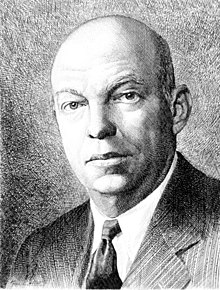Edwin Howard Armstrong | |
|---|---|
 Sketch of Armstrong, c. 1954 | |
| Born | December 18, 1890 New York City, U.S.[1] |
| Died | February 1, 1954 (aged 63) New York City, U.S. |
| Alma mater | Columbia University |
| Known for | |
| Spouse | |
| Awards |
|
| Scientific career | |
| Fields | Electrical engineering |
| Academic advisors | Mihajlo Pupin |
Edwin Howard Armstrong (December 18, 1890[2] – February 1, 1954[3]) was an American electrical engineer and inventor who developed FM (frequency modulation) radio and the superheterodyne receiver system.
He held 42 patents and received numerous awards, including the first Medal of Honor awarded by the Institute of Radio Engineers (now IEEE), the French Legion of Honor, the 1941 Franklin Medal and the 1942 Edison Medal. He achieved the rank of major in the U.S. Army Signal Corps during World War I and was often referred to as "Major Armstrong" during his career.[4] He was inducted into the National Inventors Hall of Fame and included in the International Telecommunication Union's roster of great inventors. He was inducted into the Wireless Hall of Fame posthumously in 2001.[5] Armstrong attended Columbia University, and served as a professor there for most of his life.
- ^ Tsividis, Yannis (Spring 2002). "Edwin Armstrong: Pioneer of the Airwaves". Columbia Magazine. Living Legacies: Great Moments and Leading Figures in the History of Columbia University. New York: Columbia University. Retrieved September 18, 2017.
- ^ Lawrence P. Lessing. "Edwin H. Armstrong". Britannica. Retrieved December 17, 2018.
- ^ Cite error: The named reference
nyt19540202was invoked but never defined (see the help page). - ^ Cite error: The named reference
autowas invoked but never defined (see the help page). - ^ "Edwin Armstrong". wirelesshistoryfoundation.org. Archived from the original on March 15, 2024. Retrieved July 27, 2024.